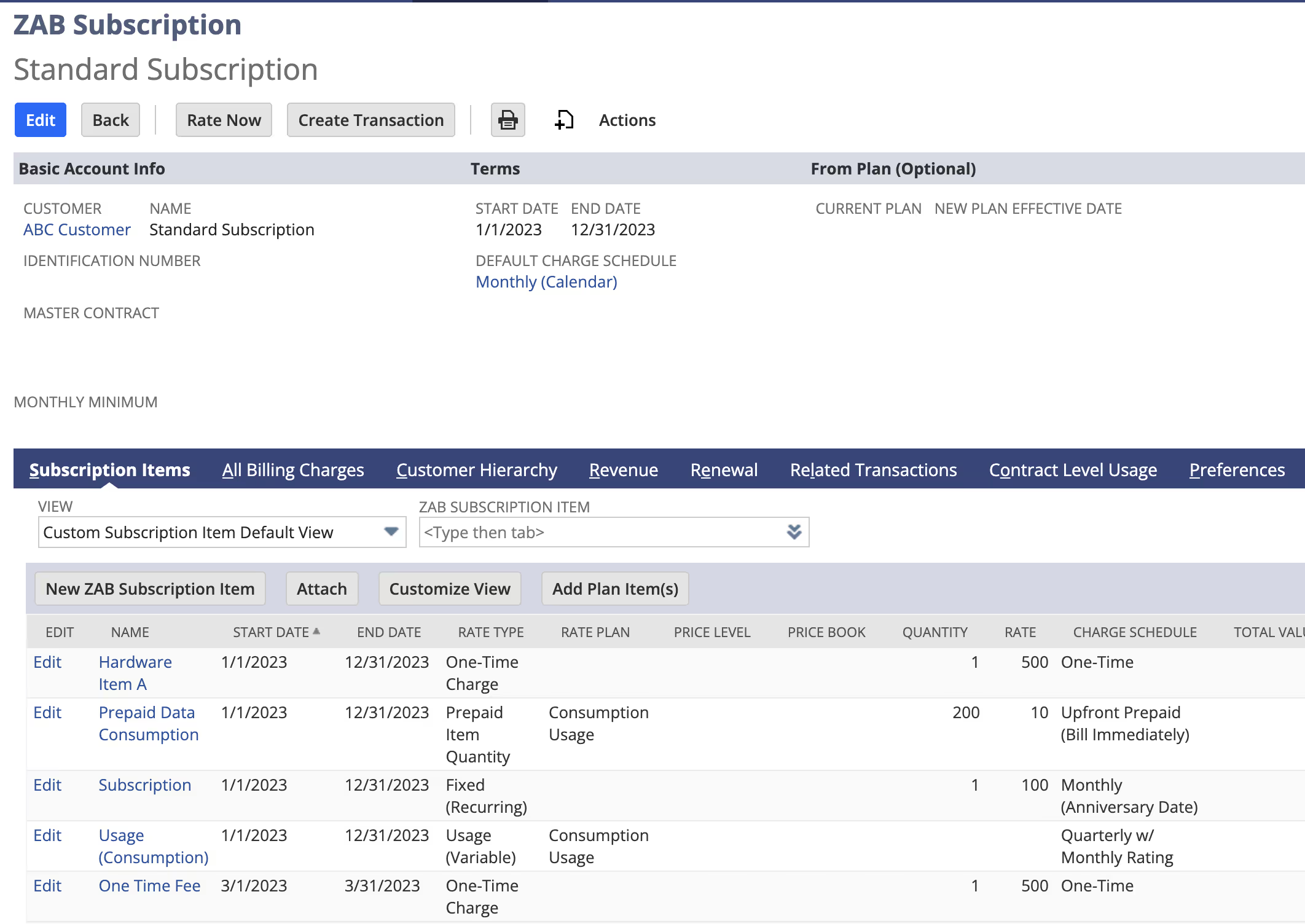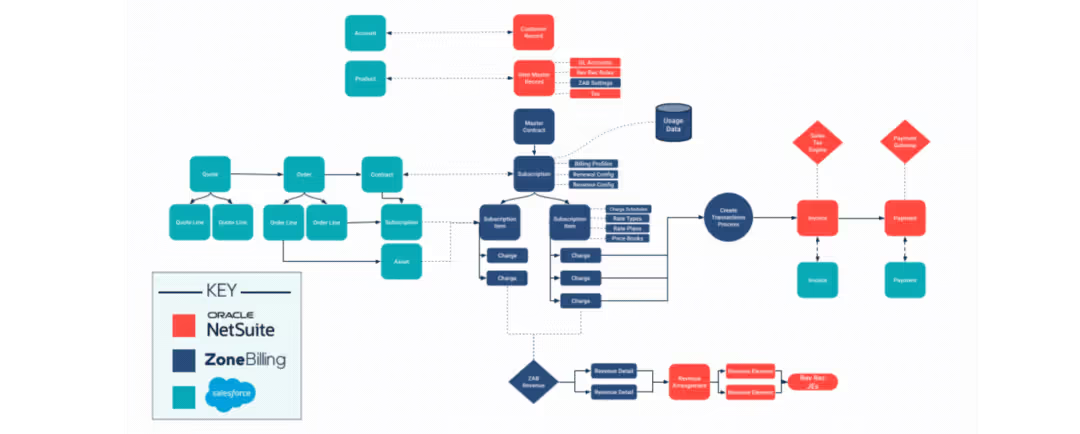
Level up your customer billing experience with usage-based billing software
Bill usage 80% faster, recognize revenue 70% quicker and send accurate bills every time – with enhanced NetSuite usage-based billing capabilities. Fewer disputes. Smoother experiences. Happier customers.
The usage-based billing platform for finance teams who need to trust their numbers














Usage billing software built to scale – without manual workarounds
ZoneBilling automates even the most complex models while keeping your CRM and ERP in sync. It’s usage-based billing software built for real SaaS complexity.
Bill customers for any custom usage model you need with ZoneBilling
ZoneBilling is the usage-based billing platform that handles contract complexity at scale. It automates 100% of usage calculations so you can skip the spreadsheets and custom scripts – and send audit-ready invoices every time. All inside NetSuite.
- Automates billing for consumption, unit-based and custom usage models
- Applies tiered, marginal and contract pricing structures natively in NetSuite
- Tracks included units, overages and minimums across charge periods
- Supports multi-entity, multi-currency billing without bolt-ons


Connect ZoneBilling with Salesforce to close billing gaps between CRM and ERP
ZoneBilling is usage billing software that syncs Salesforce quoting with NetSuite billing – no rework, no rebooking, no missed revenue. Just clean handoffs, automated flows and billing cycles that run 90% faster than before.
- Syncs contract data from Salesforce CPQ, Sales Cloud and Revenue Cloud Advanced
- Automates billing triggers like amendments, coterms, renewals and proration
- Pushes clean, compliant data into NetSuite for invoicing and revenue recognition
- Keeps sales and finance aligned without middleware or duplicate effort


Why our customers choose ZoneBilling to manage usage-based billing
The best usage-based billing software to solve real finance challenges
Stop backtracking through broken usage data
You’re not just booking invoices. You’re reconciling what sales promised, what was delivered and what NetSuite can prove. ZoneBilling brings order to a chaotic usage-based billing process – no more patching dirty CSVs, chasing contract changes or redoing revenue recognition logic by hand. You stay out of the fire. And this time, the audit trail’s already there.


Take charge of billing, usage and revenue recognition – all inside NetSuite
Mid-month contract change. Delayed usage data. Now you're rebooking revenue and fixing invoices on Day 5 of close. ZoneBilling puts you back in charge with NetSuite usage-based billing capabilities that unify contracts, billing and revenue recognition. No manual reconciliations. Financials stay clean and compliant. Because the system doesn’t let things slip.
A usage-based billing system without the integration overhead
Every new integration is a risk. Every disconnected workflow is a liability. ZoneBilling is a usage-based billing system that runs natively in NetSuite – no middleware, no broken scripts, no extra logins. Data flows from quote to revenue without delays, sync issues or constant admin oversight. Fewer endpoints. Less debugging. More time to focus on what actually matters.

How ZoneBilling handles complex NetSuite usage-based billing
See ZoneBilling in action. Watch how our usage-based billing software handles standard usage, tiered pricing and minimum commitments – all inside NetSuite. Without spreadsheets or rework.
Frequently asked questions
What is usage-based billing?
Usage-based billing is a pricing model that charges customers for the actual amount of a service they consume – nothing more, nothing less. Common in SaaS, telecom and cloud industries, it replaces fixed fees with flexible metrics like API calls, active users or data processed. The goal is to align pricing with the value the company delivers. But while customers love the flexibility, finance teams often inherit the chaos.
The usage-based billing process is where things can get messy in finance. Raw usage data comes in late, dirty or misaligned with contracts. Then teams get stuck cleaning spreadsheets, applying complex pricing logic manually and chasing down missing fields before an invoice can even be created. That leaves the door wide open for errors in billing – revenue leakage, misstatements and audit exposure.
Listen to our podcast where experts break down the evolution of usage billing
What are the different types of usage-based billing models?
Common types of usage-based billing models include:
- Pay-as-you-go – Charges after the fact based on actual usage: API calls, transactions or time spent
- Minimum commit + overage – A baseline fee with penalties when usage goes over
- Prepaid drawdown – Usage pulls from a prepaid balance until it hits zero
- Hybrid subscription + usage – A steady base charge plus metered billing for premium features or overages
- Flat-fee unlimited – Not technically usage-based, but often layered in to simplify enterprise deals
Every one of these usage-based billing models carries operational baggage. Prepaid credits expire. SKUs get bundled. Thresholds shift. If usage data sits outside your ERP, you’re stuck stitching together a billing process from disconnected tools and manual handoffs.
Your pricing strategy can’t be tied to fragmented systems. Billing has to live where finance already works – inside the ERP. So usage-based pricing gets rated right, revenue lands where it should and your team isn’t left cleaning up billing after the quarter closes.
Continue reading:Learn how to streamline your operations by harnessing the full potential of usage billing
What is the difference between subscription-based and usage-based billing software?
The difference between subscription-based and usage-based billing software comes down to how charges are triggered and calculated.
Subscription billing software runs on predictability – same fee, same schedule, no surprises. It’s a fit for memberships, annual licenses or any product where usage doesn’t drive value. ZoneBilling handles it all natively in NetSuite – automating proration, renewals and recurring schedules without extra work.
Usage-based billing software is built for motion. Charges flex with activity – whether that’s messages sent, users active or data consumed. That means billing amounts swing cycle to cycle. The system ingests usage data, applies pricing logic – tiers, minimums, overages – then pushes clean, accurate charges downstream. No shortcuts. No room for error.
ZoneBilling automates this entire workflow natively in NetSuite – making it possible to scale a usage-based billing model without spreadsheets or bolt-on tools. Here’s how these models differ when you compare their core features.
What does usage-based billing automation mean?
Usage-based billing automation means eliminating the patchwork of spreadsheets, custom scripts and rebooked contracts that slow teams down. As usage data flows in from APIs or third-party systems, most finance teams still rely on fragile, manual processes to transform that activity into billable charges. That works until scale breaks it.
Usage tiers, minimum commitments and hybrid pricing introduce edge cases your spreadsheets can’t handle – and the more volume you have, the harder it is to keep billing accurate, timely and auditable.
How to automate usage-based billing?
The key to mastering how to automate usage-based billing is bringing usage data, rating logic and invoicing into one system. ZoneBilling does this directly inside NetSuite – no bolt-on tools or middleware required.
Our usage-based billing platform ingests raw usage, applies tiered or marginal pricing and creates charges that flow straight to native NetSuite invoices and revenue recognition. Automation gives you clean, scalable billing logic that works every time.
Learn more: Can ZoneBilling handle usage-based billing?
How do I choose the top usage-based billing software?
To choose the top usage-based billing software, start with control. Does billing live inside your ERP where finance can see and manage it? Or is it stuck in a bolt-on system with messy handoffs and sync delays? The best software eliminates reconciliation work and lets finance own the full billing cycle – from rating to revenue. That usually means it lives inside your ERP.
For companies scaling variable pricing, especially with cloud usage-based billing, flexibility and automation matter more than feature count. You’ll want a platform that supports consumption, count and ad hoc billing – and applies tiered pricing, overages, minimums or prepaids without needing custom code.
Best practices for choosing the right usage-based billing platform:
- Choose ERP-native for real-time visibility and audit trails
- Validate support for usage types and pricing logic
- Ensure ASC 606 compliance and automated revenue recognition
- Check scalability across entities, currencies and geographies
- Make sure finance – not engineering – owns the billing system
What is the best billing platform for a usage-based pricing model?
The best billing platform for a usage-based pricing model needs more than basic charge creation. It has to handle variable pricing and automate complex logic – like tiers and prepaids. And it’s best when it integrates tightly with your ERP – so finance owns the process end-to-end. If billing lives outside the ERP, expect more sync issues, broken handoffs and reconciliation overhead.
ZoneBilling was built for this. As a native SuiteApp, it runs entirely inside NetSuite – no bolt-ons or custom scripts. It supports every usage type, automates calculations, connects to revenue recognition. It also keeps billing, contracts and reporting aligned.
For any business using NetSuite with a dynamic pricing model, it’s one of the most robust enterprise-ready platforms available.
Continue reading:Where does billing belong in the modern finance tech stack?
What are the benefits of choosing ZoneBilling as a usage-based billing solution?
The benefits of choosing ZoneBilling as a usage-based billing solution start with control. Unlike bolt-ons that sit outside your ERP, ZoneBilling runs entirely within NetSuite. That means usage, pricing and billing logic live where finance works – no sync delays, no broken formulas, no rekeying. You get a single source of truth from contract to cash.
It also scales with complexity. Whether you bill per user, per API call or across prepaid pools, ZoneBilling automates usage calculations, rating logic and charge creation. It was designed to adapt to any billing, pricing or product model – all without manual workarounds or custom scripts. And with built-in revenue recognition tied to NetSuite ARM, you're always audit-ready.
Among the leading real-time billing providers in the usage-based industry, ZoneBilling stands out for its ability to support high-growth companies with global operations in industries like SaaS, fintech, marketing and professional services. Multi-currency? Covered. Complex contracts? Streamlined. Real-time metrics? Native.
And because it’s NetSuite-native, teams avoid the cost and risk of stitching together multiple systems just to bill accurately.
Continue reading:Prepare your billing system for growth and stay ahead as your business evolves
What makes ZoneBilling the best SaaS usage-based billing platform?
What makes ZoneBilling the best SaaS usage-based billing platform is simple – it keeps your entire billing operation inside NetSuite, where finance already works. No piping data between platforms. No broken integrations to fix. No spreadsheets to build when usage changes.
ZoneBilling automates usage capture, pricing and revenue recognition in NetSuite – without external tools or manual fixes. Charges post fast and stay accurate, auditable and built to scale with your pricing model. It handles the most complex scenarios – prepaid drawdowns, usage tiers, pooled minimums, contract uplifts and mid-term amendments.
And because it applies billing rules before creating transactions, finance teams don’t have to rebook contracts or chase errors downstream when a usage tier gets missed mid-cycle or a prepaid balance isn’t properly offset. That’s what makes ZoneBilling one of the leading real-time billing providers in the usage-based industry.
How long does it take to implement Zone & Co's usage-based billing system?
The timeline for implementing Zone’s usage-based billing system depends on your business complexity – and whether you’re implementing NetSuite at the same time. Most go-lives take a few months. But ROI hits fast.
With Zone’s usage billing software, customers see results in six to nine months: 90% faster billing and 94% reduction in revenue booking time.
Continue reading: How Power Factors achieved a 94% reduction in revenue booking time using ZoneBilling






